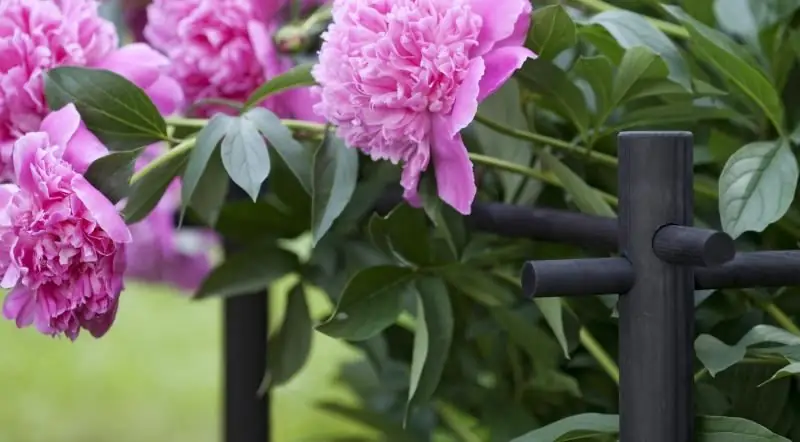
Table of contents:
- Author Bailey Albertson albertson@usefultipsdiy.com.
- Public 2023-12-17 12:53.
- Last modified 2025-01-23 12:41.
What materials for paths between beds will help to forget about weeds

Weeds are a constant problem for gardeners. They have to be weeded out not only from the beds, but also between them. To make their work easier, many gardeners go to the trick - they cover the aisle with dense materials that prevent weed grass from growing. Let's consider what can be used for these purposes.
Sawdust

Wood shavings, shavings or small chips are natural and affordable material for paths. They pass moisture and air well, while being easy to use. Before backfilling, the soil in the aisles is spilled with water. Then lay layers of covering material with a thickness of at least 3 cm and carefully tamp it. You can also put geotextiles on the ground under sawdust or shavings - it is durable and permeable to water.
Sawdust from coniferous trees is preliminarily kept in a separate place for at least a year. Or they are treated with a urea solution before filling. They cannot be used fresh - they acidify the soil, which can lead to disease and death of cultivated seedlings.
Boards

It is a comfortable and environmentally friendly material for paths between rows. The boards are polished, treated with an antiseptic and laid on a leveled and tamped surface, which is preliminarily covered with geotextiles and covered with gravel.
You can also make a flooring raised above the ground.
Crushed stone

Well suited for areas with a flat surface, without slopes. You can use both an expensive option - granite, and a cheaper one - limestone. The main thing is to adhere to a certain styling technology. It is necessary to outline the boundaries of the path in advance, dig a trench 15 cm deep. Tamp the soil at the bottom and cover with geotextile. Then fill in a layer of rubble, spill it with water and also tamp it. Then fill in the second layer of material. Top with sand, if desired.
On the sides of the tracks, be sure to make bumpers. If they are not built, the rubble will crumble over time.
Black film

As a covering material for the aisles, you can use black cloth, for example, geotextile or film. They are characterized by high strength and durability, while allowing air and moisture to pass through.
During installation, the edges of agrotextile must be fixed with staples on the ground surface. It is more convenient to use narrow rolls for arranging tracks.
Tree cuts

A beautiful and environmentally friendly coating. It is best to use pine or larch to create high quality and durable paths. The height of the cuts should be at least 20 cm - lower blocks of wood will be unstable.
Before installing the cuts, you need to outline the boundaries of the path and dig a trench about 30 cm deep. A layer of sand and gravel is poured into it. On the resulting drainage, wooden circles are installed tightly to each other, alternating between small and large parts. The gaps between them are covered with gravel and sand. The finished track is spilled with water and treated with an antiseptic.
Rubber tile

Suitable for laying on a flat surface. No support is required for this material. Locking connections provide strength and integrity to the coating. Among the advantages of the tile, one can note a long service life, ease of installation.
The rubber cover does not allow moisture to pass through, therefore, a slope should be provided when laying.
Sidewalk tile

Paving slabs perfectly prevent the germination of weeds. However, when laying it, it is important to observe the process technology. First you need to outline the boundaries of the tracks. Then remove the soil, make the base, install the curbs, lay the sand and gravel underlay and finally the tiles themselves. Fill the seams between its parts with sand. Laying begins from the gate or doors of the house. At regular intervals, be sure to check how evenly the tile lays down.
Plastic bottle caps

A path made of corks from plastic bottles allows you to show creativity. They are connected to each other with a wire or a strong cord and laid on a prepared base - cleaned and leveled soil.
If you have a large number of corks of different colors, you can make tracks with patterns. The coating is durable and beautiful in all respects.
Using one of the above ideas, you can forget about weeds for a long time on the paths between the beds.
Recommended:
Fences For Garden Beds With Your Own Hands - How To Make A Fence For A Front Garden, Flower Garden Or Vegetable Garden, Step By Step Instructions With A Photo

Options for fences for a suburban area. Their pros and cons. How to install a holder for plastic bushes, a flower bed from bottles: step by step instructions. Video
Why You Can't Ask The Dead For Help: Signs And Opinions Of The Church

Why you can't ask the dead for help: signs and superstitions, the opinion of the church
How To Easily Get Rid Of Weeds And Grass Forever With Folk Remedies

How to get rid of weeds using folk methods. Can vinegar, salt and other aggressive substances be used against a herb to remove it forever?
Changes In The Personal Life Of Zodiac Signs That Can Help You Become Happy

Astrologers are convinced that 2020 will be a year of changes in personal life. Zodiac signs that will find love and become happy
How To Keep Your Garden Beds From Drying Out

What methods can be used to protect vegetable beds from drying out the soil
